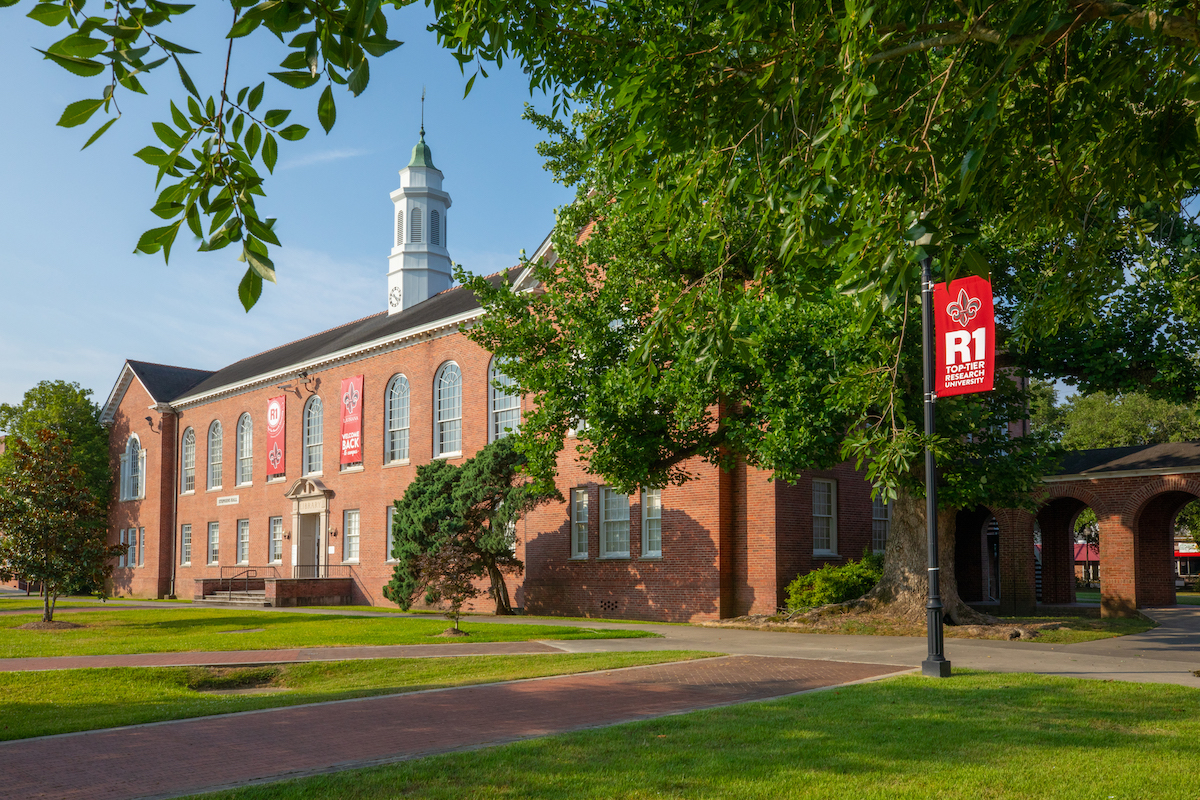The Carnegie Classification of Institutions of Higher Education’s R1 designation cements a university’s position as a top-tier research institution, punctuating academic excellence, scholarship, research, service, innovation and global impact. It’s a designation just 146, or 3%, of the country’s public and private universities have earned, a lofty perch the University of Louisiana at Lafayette grasped at the close of 2021. The University’s R1 status brought notice in Washington D.C., applause from Louisiana Gov. John Bel Edwards and state lawmakers in Baton Rouge, and merited a campus research showcase. R1, indeed, is a very good place to be. Topping a long list of reasons why? Its capacity to empower.
The R1 designation, which Carnegie evaluates every three years, provides a springboard for a university to expand the cutting-edge research and scholarship that propelled it to R1; strengthens its ability to attract exemplary students and faculty members; and fans its role as an engine for economic and workforce development. Dr. Joseph Savoie, UL Lafayette president, said the designation places a resounding stamp on the University’s longstanding reputation as an international hub for teaching, learning and research. It also offers a gateway to opportunity. “R1 is a testament to our faculty, staff and students who, together, have proven dedicated, capable stewards in the University’s decades-long mission to create an environment that fosters student success and where life-changing research happens,” he said. “That’s cause for immense pride and confidence, especially as we move forward. As with those who came before us, it is our obligation to make certain that those who come after us can reach even greater heights.”
Dr. Ramesh Kolluru, vice president for Research, Innovation and Economic Development, said the University is well-positioned to leverage R1 status. His reasoning is straightforward: “R1 opens doors.” The designation provides access to external funding a university otherwise wouldn’t be eligible to pursue; paves the way for new academic degrees and programs; gives additional heft to graduates’ degrees; spurs partnerships with industry seeking established sources of intellectual capital; influences policymakers and lawmakers; and inspires philanthropy. “Research isn’t done on an island, and we’re engaging with collaborators who might not have sought us out before. I’m seeing it from industry. From federal funding agencies. In interest from the community,” Kolluru said.
“R1 opens doors.” Dr. Ramesh Kolluru
It all amounts to self-generated opportunity. The University’s research and development expenditures, a key metric in attaining R1 status, increased by $119 million between 2013 and 2021. UL Lafayette also secured $65 million in federal R&D funding, the most in history. And, for a second consecutive time, it is the nation’s seventh-best university for research funded through collaboration with business and industry. “We intend to sustain that momentum,” Kolluru said, “and keep moving forward.”
Graduate School growth, another factor in the attainment of R1 status, has also been substantial. From Fall 2010 to Fall 2021, overall graduate enrollment rose 73%. The increase among doctoral students was 47%. That has translated into a record number of graduate degrees awarded since 2010; master’s degrees climbed by 81% and doctoral degrees by 120%. Dr. Mary Farmer-Kaiser, dean of the Graduate School, attributes the growth to “our faculty members, who perform at a very high level, and our graduate programs, which offer tremendous opportunities for our students to succeed in the classroom and seek high-demand jobs once they graduate.”
Farmer-Kaiser envisions continued progress as a result of the R1 designation, which is influencing a push to develop additional graduate programs, degrees and initiatives, particularly at the doctoral level. That will happen as a function of the same sort of intentionality that has helped guide Graduate School successes and earned R1 status for the University, she explained. “Neither has been accidental, nor happened overnight, but are the result of comprehensive strategic planning and step-by-step gains.”
Following the R1 designation, the University created a $400,000 dissertation fellowship fund through a partnership with the UL Lafayette Foundation. The fund will support doctoral students in their final year of study, enabling them to focus solely on researching and writing their dissertations. That’s significant for students and, as with R&D expenditures, is important to R1 status.
Carnegie considers three weighted values in according the designation: R&D expenditures reported through the National Science Foundation’s Higher Education Research and Development Survey; the number and caliber of research staff; and the number of doctoral degrees awarded. Expenditures are measured in STEM subjects – science, technology, engineering and mathematics – and areas such as business, education, humanities, public policy, social science and social work, Kolluru said. “R1 is proof positive that we perform at a high level, across campus, and that’s exciting, because it will enable us to strengthen our research infrastructure, and strategically create new academic programs and full-time faculty positions across all colleges.”
For Kolluru, the University-wide advantages of being an R1 university – the validation it offers, the opportunities it affords, the potential it engenders – rest heavily on one word: investment. “Our R1 success has resonated so widely, and is so essential, because it affirms what we and others have long known – we are a good investment,” he said. “The community knows we’re a good investment. Industry knows we’re a good investment. Our supporters, whose generosity helps to propel student and faculty success, know we’re a good investment. Employers know our graduates are a good investment.”
“So now, as much as at any time in history, we are poised to become an exponentially stronger investment. And that will happen as it always has, by redoubling our commitment to our core foundational values, our dedication to academic excellence and our pursuit of research that has global impact,” Kolluru said.
Photo credit: Doug Dugas / University of Louisiana at Lafayette
This article first appeared in the Spring 2023 issue of La Louisiane, The Magazine of the University of Louisiana at Lafayette.
